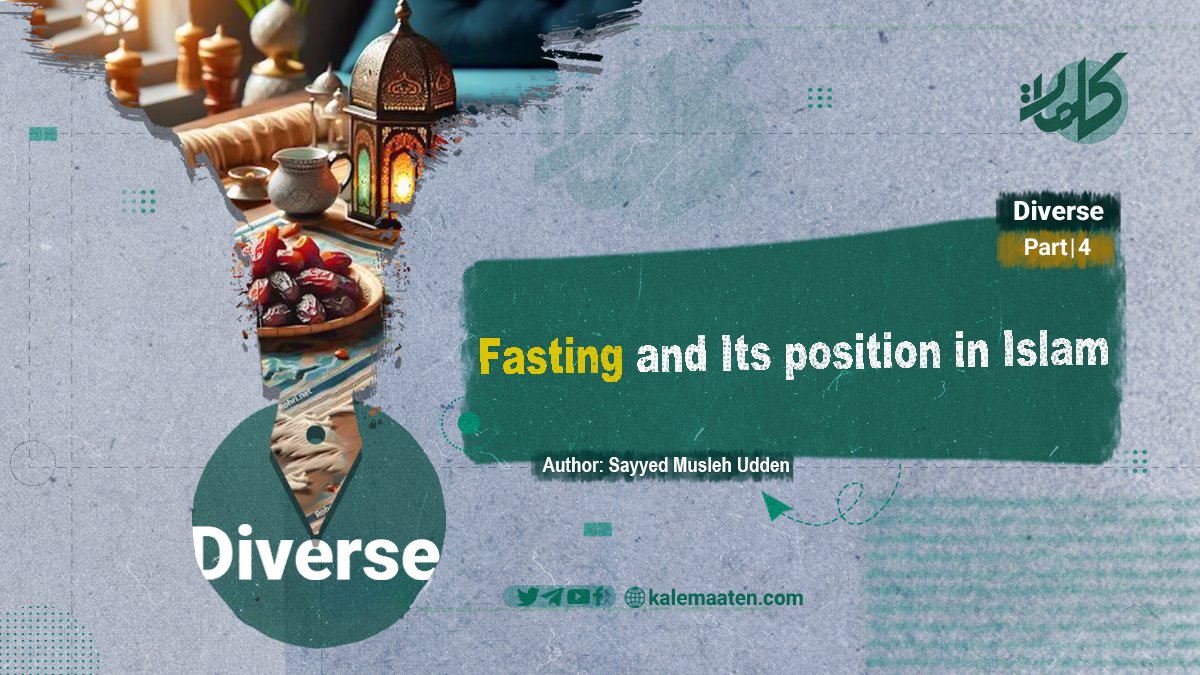
Author: Sayyed Musleh Uddin
Fasting and Its Position in Islam (Part Four)
Fasting: Its Objectives and Its Impact on the Soul and Life
Hujjat al-Islam Ghazali (MABH) has addressed this matter in his unique way, stating: “The purpose of fasting is to adorn oneself with the attributes of Allah, (SWT); that is, to attain Samadiyyah, and to emulate the angels by refraining from desires as much as possible, for they are free from desires. Man, by his nature, is superior to animals because, with the light of intellect, he can break the power of desires; however, his position is lower than that of angels because desires overpower him, and he must struggle against them. Therefore, whenever he succumbs to his desires, he will fall to the lowest degree and join the ranks of animals. Conversely, whenever he suppresses his desires, he will rise to the highest degree and connect with the ranks of the angels.”
Alama Ibn al-Qayyim (MABH) elaborated further on this matter, saying: “The goal of fasting is to control the soul from desires, to detach it from habits, and to balance the sensual energy so that it may prepare itself for seeking the goal in which the secret of happiness and its eternal success lies. Fasting reduces the intensity of hunger and thirst, brings the plight of the starving and the poor to one’s attention, and narrows the ways for Satan to reach a person by constricting the passages of food and water. It prevents the body from indulging in behaviors that would harm it both in this world and the Hereafter, calming every part of the body, controlling its powers, and restraining them with a bridle. Thus, fasting is the bridle of piety, the shield of the warriors, and the garden of the righteous and the near ones.”
Alama Ibn al-Qayyim (MABH) continued to eloquently explain the secrets and objectives of fasting, stating: “Fasting has an extraordinary effect on preserving the external limbs and internal faculties, protecting them from contamination with corrupt substances. These corrupt substances, if they overpower a person’s limbs and faculties, corrupt them. Fasting also purges the harmful substances that hinder health, thus ensuring the wellbeing of the heart and body. It restores what the claws of lust have seized from them. Fasting is the greatest ally and helper of piety and godliness, as Allah, the Almighty, says: «يَا أَيُّهَا الَّذِينَ آمَنُوا كُتِبَ عَلَيْكُمُ الصِّيَامُ كَمَا كُتِبَ عَلَى الَّذِينَ مِن قَبْلِكُمْ لَعَلَّكُمْ تَتَّقُونَ», Translation: “O you who have believed, fasting has been prescribed for you as it was prescribed for those before you, that you may become righteous.” The Noble Messenger (pPBUH) also said: “Fasting (as opposed to committing sin) is a shield and protection.” He commanded those who are overwhelmed by lust and unable to marry to fast, considering fasting as the means to overcome this desire.
The goal is that since intellects and sound natures testify to the benefits of fasting, Allah, the Almighty, has made it lawful for them as a mercy, a favor, a prevention, and a shield.
Returning once again to the main subject, he states: “Since the wellbeing and steadfastness of the heart on the path that leads to Allah, the Almighty, depend on focus and turning towards Him while consolidating distractions, the Merciful and Gracious Lord has decreed fasting as a way to eliminate excess food and drink and cleanse the heart from the corruptions of desires that hinder its journey towards Allah. Indeed, the fragmentation of the heart cannot be resolved except through turning towards Allah. Excessive food, drink, contact with people, speaking, and sleeping further scatter the heart, leading it into confusion and disorienting its path. These distractions can cut off or destroy the heart’s journey towards Allah. Moreover, Allah, the Almighty, has legislated fasting in a manner that benefits a person both in this world and the Hereafter, causing no harm and not eliminating the benefits, whether short-term or long-term.”
Continues…


